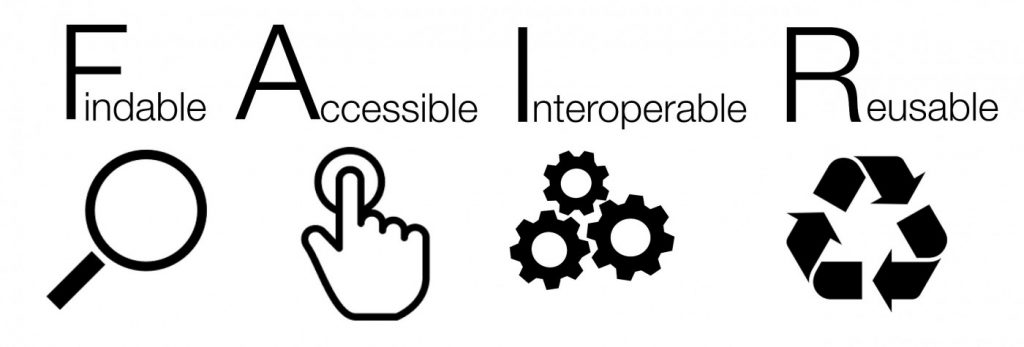
FAIR guiding principles for data resources (SanguaPundir 2016) CC-BY-SA
FAIR aims to improve the value and impact of research data by ensuring it is Findable, Accessible, Interoperable and Re-useable. All data produced by researchers at BU should be FAIR, and many journals and funders have made it a condition for successful submission or grant applications. Over a series of posts I will look at each one and explain what this means for the data you produce. Click here if you want to read the previous posts on Findability and Accessibility.
Interoperable
Researchers may well be able to find your data without restrictions (Findable, Accessible), but they may not be able to use your data if it is not available in a useable format. Imagine if valuable data was only available on a floppy disk… Not much use to most of us!
Data can be opened-up to more people if we make them available in open, interoperable formats. The UK Data Service has a list of recommended formats. Spreadsheets, for example, should be saved as .csv files. This is an open format, so users do not necessarily need a paid for solution like Microsoft Excel to open it.
For more information visit the Library’s Research Data Management guide or email bordar@bournemouth.ac.uk.
Dan Bailyes
Faculty Librarian (FMC) and LLS lead for Research Data Management (RDM)
References
SanguaPundir., 2016. FAIR guiding principles for data resources [image]. Wikimedia Commons. Available from: https://commons.wikimedia.org/wiki/File:FAIR_data_principles.jpg [Accessed 08 July 2021].











 Dr. Ashraf cited on ‘Modest Fashion’ in The Guardian
Dr. Ashraf cited on ‘Modest Fashion’ in The Guardian NIHR-funded research launches website
NIHR-funded research launches website Academics write for newspaper in Nepal
Academics write for newspaper in Nepal New paper published on disability in women & girls
New paper published on disability in women & girls MSCA Postdoctoral Fellowships 2025 Call
MSCA Postdoctoral Fellowships 2025 Call ERC Advanced Grant 2025 Webinar
ERC Advanced Grant 2025 Webinar Horizon Europe Work Programme 2025 Published
Horizon Europe Work Programme 2025 Published Horizon Europe 2025 Work Programme pre-Published
Horizon Europe 2025 Work Programme pre-Published Update on UKRO services
Update on UKRO services European research project exploring use of ‘virtual twins’ to better manage metabolic associated fatty liver disease
European research project exploring use of ‘virtual twins’ to better manage metabolic associated fatty liver disease